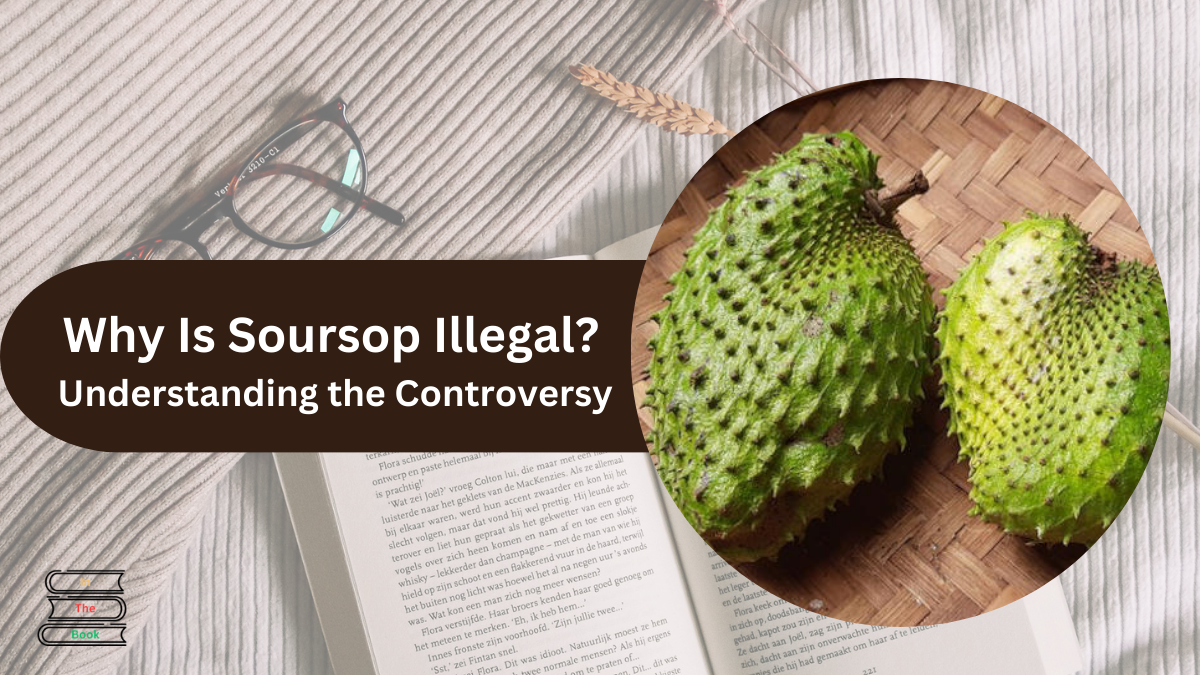Soursop, or graviola, is a tropical fruit known for its delicious flavour and potential health benefits. Native to the Caribbean, Central America, and parts of South America, soursop has gained popularity worldwide, mainly among those seeking natural remedies.
However, there has been controversy surrounding the legality of soursop in certain countries. This article explains why is soursop illegal, the reasons behind the restrictions, and the debate over its safety.
Contents
- What is soursop?
- The health claims and controversy
- Why is soursop illegal in some places?
- Neurotoxicity:
- Risk of misinformation:
- Lack of regulation:
- Where is soursop illegal?
- Should you consume soursop?
- Some Questions
- Why is soursop illegal in some countries?
- Is soursop safe to eat?
- Can soursop cure cancer?
- Where is soursop banned?
- What are the benefits of soursop?
What is soursop?
Soursop is a large, green fruit with spiky skin and soft, fibrous flesh. Its sweet and tangy flavour is often described as a combination of strawberry, pineapple, and citrus. The fruit is commonly eaten fresh, made into juices, or used in desserts.
Beyond its culinary uses, soursop has also traditionally been used in herbal medicine to treat various ailments, from inflammation to infections.
The health claims and controversy
One of the main reasons soursop has gained attention is its claims of powerful health benefits, particularly its potential to fight cancer. Some studies have suggested that compounds found in soursop, such as acetogenins, may have anti-cancer properties.
These studies have primarily been conducted in laboratories or on animals, and while the results are promising, they are far from conclusive.
However, the promotion of soursop as a cancer treatment has led to significant controversy. Medical experts caution against using soursop as an alternative to conventional cancer treatments, as there is no solid scientific evidence proving its effectiveness in humans.
Also, some studies have raised concerns about the potential toxicity of soursop, particularly in large amounts, which has led to its regulation in certain countries.
Why is soursop illegal in some places?
The legality of soursop varies by country, and in some places, it is restricted or even banned. The reasons for this are primarily related to concerns about safety and the lack of conclusive research on its effects.
Neurotoxicity:
Some studies have suggested that the consumption of soursop, particularly its seeds, may be linked to neurotoxicity, which could lead to symptoms similar to Parkinson’s disease. These concerns have led to warnings about the long-term consumption of soursop, especially in large quantities.
Risk of misinformation:
The promotion of soursop as a “miracle cure” for cancer and other serious diseases has been a significant concern for health authorities. There is a risk that individuals may forgo proven medical treatments in favor of using soursop, which could lead to worsening health outcomes.
Lack of regulation:
In some countries, the sale of soursop and soursop-based products is restricted due to a lack of regulation and oversight. This is especially true in places where herbal supplements and natural remedies are not closely monitored, raising concerns about the quality and safety of these products.
Where is soursop illegal?
While soursop is widely available in many countries, including the United States and much of Latin America, it is restricted or banned in some places. For example, in parts of Europe, there are strict regulations on the sale of soursop products, mainly those that are marketed as health supplements.
The European Food Safety Authority (EFSA) has raised concerns about the potential health risks associated with soursop, leading to tighter controls on its sale.
In other regions, such as Canada, soursop is not banned but is subject to regulation, particularly when it comes to its use in health products. Health Canada has issued warnings about the potential risks of consuming soursop, particularly in large quantities, and advises caution when using it as a supplement.
Should you consume soursop?
For most people, consuming soursop in moderation as part of a balanced diet is considered safe. However, it is essential to be aware of the potential risks, particularly if you are considering using soursop for its purported health benefits.
If you have any underlying health conditions or are taking medication, it is always best to consult with a healthcare provider before adding soursop or any new supplement to your diet.
Additionally, be cautious of any products that make bold claims about soursop’s ability to cure or treat serious illnesses. While the fruit does have some promising properties, more research is needed to fully understand its effects on human health.
Some Questions
Why is soursop illegal in some countries?
Soursop is restricted or banned in some countries due to concerns about its potential neurotoxicity, the risk of misinformation regarding its health benefits, and the lack of regulation around its sale.
Is soursop safe to eat?
Soursop is generally safe to eat in moderation. However, there are concerns about its potential toxicity, especially if consumed in large amounts or over a long period.
Can soursop cure cancer?
There is no conclusive scientific evidence that soursop can cure cancer. While some studies suggest it has anti-cancer properties, these findings are not yet proven in humans.
Where is soursop banned?
Soursop is restricted or banned in some European countries and is regulated in places like Canada, particularly when used in health supplements.
What are the benefits of soursop?
Soursop is rich in vitamins and antioxidants, and it has been traditionally used to treat a variety of ailments. However, its purported health benefits, particularly in treating serious diseases, are still under research.
Click Here To Know More

Chandler is an avid automobile enthusiast who is passionate about all things on wheels. From the latest car models to classic vintage rides, I love exploring the automotive world’s intricate details and engineering marvels. With years of experience in test-driving, reviewing, and analyzing cars, I provide readers with comprehensive insights and honest opinions.


























